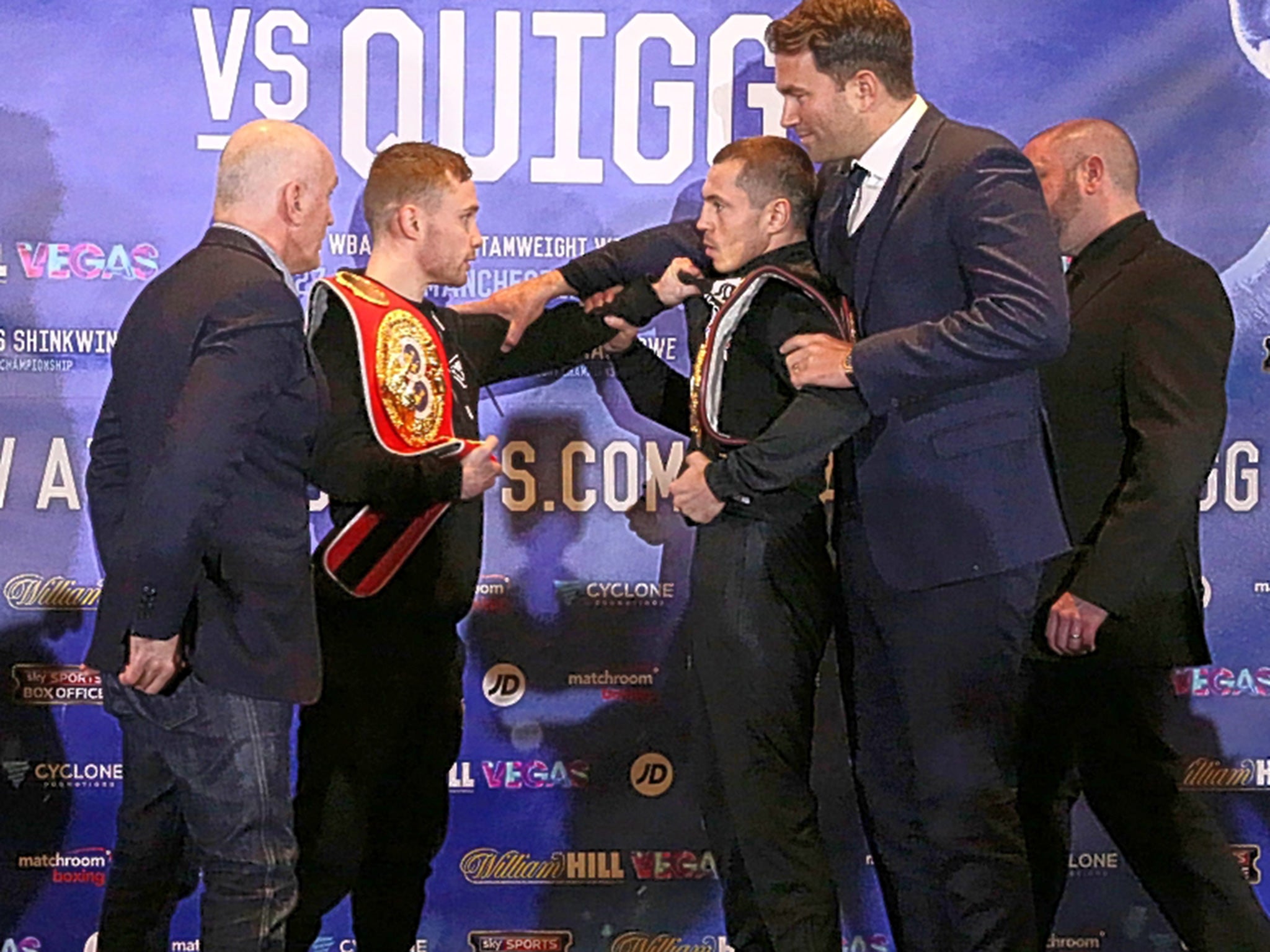Carl Frampton vs Scott Quigg: Rich reward and real hate for heirs of Wee Walter, writes Steve Bunce
When Frampton and Quigg collide on Saturday night there will be no love lost and much money to be gained by two streetwise fighters who came up the hard way. Steve Bunce reflects on their ascent and the similarities with another Briton who rose from obscurity to win a world title

Long before Scott Quigg was part of Saturday’s fight in Manchester and long before 10,000 set sail from Belfast for Carl Frampton’s part in the mayhem, the two boxers were anonymous scrappers in a forgotten realm.
The death last week of Wee Walter McGowan, one of only four British boxers to hold a world title in the Sixties, was a timely reminder of how the dirty old business of boxing worked; Quigg and Frampton are cut from the same harsh cloth as the brilliant Scotsman.
They collide, which is the right word, on Saturday at the Manchester Arena for two world title belts, with too much pride and enough bad manners to make a case for this having as much nastiness attached as the rematch between Carl Froch and George Groves in 2014 at Wembley Stadium. If this fight had fallen in the summer then a crowd of 50,000 would not have been a shock. This is not a phoney war.
In the Sixties McGowan alternated between sellouts at Wembley, in Bangkok and in Rome, where he seemed to fight all the time, and cameos at gentlemen-only sporting clubs behind closed doors.
He took risky fights in the weeks before major bouts and was often back in the ring just weeks after gruelling 15-rounders. It was a relentless and unforgiving business that McGowan briefly ruled and he was out of the game after his personal wars, having had more fights than either Quigg or Frampton, by the time he was 28; Quigg is 27 and Frampton 29.
When Quigg turned professional in 2007 he was fighting way under any radars in front of 200 or so at dinner shows in obscure hotels, where the topless raffle ticket sellers and blue comedian are the real attractions. He was beyond the circuit that wistful observers like to tag as “old school”; he was grubbing a living on the undercards of now vanished fighters and nobody was looking.
Frampton went pro two years later after a short journey near the elite level of the amateur business and he also fought in obscurity, but he was being protected from the inevitable pressure and expectation firmly attached to any quality Belfast product. He won in Huddersfield, Middlesborough and Bethnal Green; his first fight was at a venue in Liverpool that once had two camels living in its basement. McGowan would have approved.
Now the pair hold a world title each, two of 12 that British boxers have, and are unbeaten, slick players in a business that will reward them with millions for Saturday’s fight. McGowan would have no idea about the sums, having been tempted to Thailand by 10 grand 50 years ago to lose his world title.
Britain's current boxing world champions
Show all 8There was talk of Quigg fighting Frampton four years ago and it was more than just idle chat putting the pair together. Thankfully, that never happened and now they will split ridiculous riches from the gate and the pay-per-view sales.
Eddie Hearn, the co-promoter of Saturday’s fight, was once in Frampton’s camp and talked boldly of Frampton knocking out Quigg; he is now in Quigg’s camp and talks boldly of Quigg knocking out Frampton. It’s not quite as contradictory and ruthless as Don King once was, but it is still an impressive piece of repositioning.
In 1973 King was involved with the Sunshine Showdown in Jamaica between the world heavyweight champion Joe Frazier and the raw but lethal George Foreman. King arrived at the venue with Frazier in the champ’s limo and entered the ring with Frazier but, after each brutal knockdown inflicted by Foreman’s iron fists, he moved further away from the corner.
At the end of the fight, Foreman was the new heavyweight world champion and Frazier, after six knockdowns, was the loser: King stepped over Frazier to switch camps, left the ring with Foreman and travelled back to the celebratory party in the new champion’s limo. “Ain’t it a bitch?” King told me once when I reminded him about the story, but added: “I never stepped over Joe, I like Joe. I stepped around him.”
There has been a deeply personal edge to Saturday’s fight – nothing fake – since it was announced and sold out in minutes. Some old wounds from the short dalliance of the Frampton team, which includes the highly volatile Barry McGuigan, with Hearn’s business have left the type of sores that fester for a long time in the boxing world.
A short three-city press tour was brutal at times and both sets of major players have claimed tiny victories from the skirmishes. It is refreshing to have two rival camps that are honest enough to speak of their hatred for each other. Last December there was a nasty fight, after years of insults, between Anthony Joshua and Dillian Whyte and neither shook hands at the end – it’s not particularly sporting, but it is honest; Saturday’s fight has many of the same hateful characteristics.
It can get annoying when I hear people waffling on about respect when I know that the two boxers, their promoters and their trainers detest each other. Wee Walter would understand and he would take it personally.
Subscribe to Independent Premium to bookmark this article
Want to bookmark your favourite articles and stories to read or reference later? Start your Independent Premium subscription today.

Join our commenting forum
Join thought-provoking conversations, follow other Independent readers and see their replies